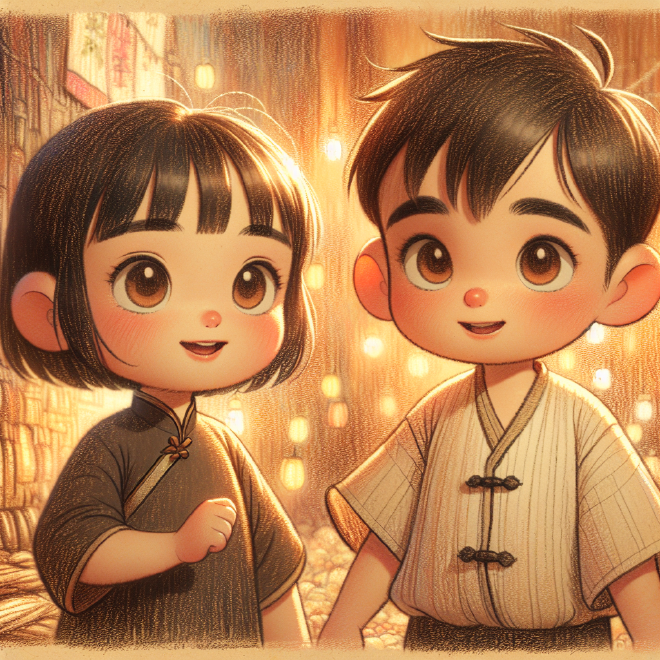纸鹤的约定

Table of Contents
Audio #
汉字 #
小明和丽丽为了即将到来的重阳节,决定为爷爷奶奶制作一张手绘贺卡。他们先去文具店买了画纸、彩笔和胶水。回到家后,他们认真地开始制作贺卡。小明负责画菊花和山峰,丽丽负责书写祝福语。他们在贺卡上写了“身体健康,节日快乐”,并在旁边画了一些心形图案。
完成后,他们满怀期待地把贺卡交给爷爷奶奶。爷爷奶奶看着孩子们亲手制作的贺卡,脸上露出了幸福的笑容。他们夸奖道:“你们真懂事,重阳节收到这样的礼物,我们很开心!”
小明和丽丽也非常高兴,看着爷爷奶奶的笑容,觉得自己的努力没有白费。重阳节那天,一家人围在一起吃了美味的晚餐,爷爷奶奶和孩子们度过了一个暖心的节日。
Pinyin #
Xiǎo Míng hé Lì Lì wèile jíjiāng dàolái de Chóngyáng Jié, juédìng wèi yéyé nǎinǎi zhìzuò yī zhāng shǒuhuì hèkǎ. Tāmen xiān qù wénjùdiàn mǎile huàzhǐ, cǎibǐ hé jiāoshuǐ. Huí dào jiā hòu, tāmen rènzhēn de kāishǐ zhìzuò hèkǎ. Xiǎo Míng fùzé huà júhuā hé shānfēng, Lì Lì fùzé shūxiě zhùfúyǔ. Tāmen zài hèkǎ shàng xiěle “shēntǐ jiànkāng, jiérì kuàilè”, bìng zài pángbiān huàle yīxiē xīnxíng tú’àn.
Wánchéng hòu, tāmen mǎnhuái qídài de bǎ hèkǎ jiāo gěi yéyé nǎinǎi. Yéyé nǎinǎi kànzhe háizimen qīnshǒu zhìzuò de hèkǎ, liǎn shàng lùchūle xìngfú de xiàoróng. Tāmen kuājiǎng dào: “Nǐmen zhēn dǒngshì, Chóngyáng Jié shōudào zhèyàng de lǐwù, wǒmen hěn kāixīn!”
Xiǎo Míng hé Lì Lì yě fēicháng gāoxìng, kànzhe yéyé nǎinǎi de xiàoróng, juédé zìjǐ de nǔlì méiyǒu báifèi. Chóngyáng Jié nà tiān, yījiā rén wéi zài yīqǐ chīle měiwèi de wǎncān, yéyé nǎinǎi hé háizimen dùguòle yīgè nuǎnxīn de jiérì.
English Translation #
Xiaoming and Lili, preparing for the upcoming Chongyang Festival, decided to make a handmade greeting card for their grandparents. First, they went to the stationery store to buy drawing paper, colored pens, and glue. Back home, they carefully started creating the card. Xiaoming was responsible for drawing chrysanthemums and mountains, while Lili was in charge of writing the blessings. On the card, they wrote “Good health and Happy Festival,” and drew some heart-shaped patterns beside it.
After completing the card, they handed it to their grandparents with anticipation. Their grandparents, looking at the handmade card created by the children, smiled warmly. They praised, “You are thoughtful! Receiving such a gift for Chongyang Festival makes us very happy!”
Xiaoming and Lili were also delighted. Seeing their grandparents’ smiles, they felt their efforts were worthwhile. On the Chongyang Festival day, the family gathered together to enjoy a delicious dinner. The grandparents and children celebrated a warm and joyful festival.
Grammatical Points and Analysis #
Verb-Object Phrases: #
- 制作贺卡 (zhìzuò hèkǎ): To make a greeting card. “制作” serves as the verb and “贺卡” as the object.
- 写祝福语 (xiě zhùfúyǔ): To write blessings. A common verb-object structure.
Resultative Complements: #
- 完成后 (wánchéng hòu): “After completing,” where “完成” indicates completion of the action. Used to emphasize the result.
Time Expressions: #
- 即将到来的重阳节 (jíjiāng dàolái de Chóngyáng Jié): “The upcoming Chongyang Festival.” “即将” highlights the imminent nature of the event.
Questions #
Question 1 (English): What materials did Xiaoming and Lili buy to make a greeting card?
Question 1 (Pinyin): Xiǎo Míng hé Lì Lì mǎile shénme cáiliào zhìzuò hèkǎ?
Question 2 (English): How did the grandparents react to the greeting card?
Question 2 (Pinyin): Yéyé nǎinǎi kàn dào hèkǎ shì zěnme fǎn yìng de?
Click to show the answer
Disclaimer: This story is purely fictional and generated by AI. Any similarities to real people, places, or events are purely coincidental.